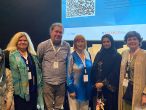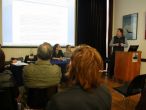ICOM South-Eest Europe Annual Conference 2023
ICOM SEE Annual Conference CALL FOR PAPERS
16 – 17 October 2023
Venue: National Museum of the Romanian Peasant, Bucharest, Romania
DEADLINE for APPLICATION: 30 June 2023
MAIN THEME: Museums, Sustainability and Wellbeing
Subtitle: Celebrating 20 Years of Convention for the Safeguarding of the Intangible Cultural Heritage (17 October 2003—17 October 2023)
ICOM South East Europe (ICOM SEE) is pleased to announce its annual conference, which will be held in Bucharest, Romania on 16 and 17 October 2023. The conference theme is aligned with the International Museum Day 2023 theme “Museums, Sustainability and Wellbeing”. The aim of the conference is to explore the relationship between museums, sustainability and wellbeing, and to discuss how museums can contribute to a more sustainable and content society, thus including the topics of food heritage, tangible and intangible heritage.
Museums have a unique role to play in promoting sustainability and wellbeing. As cultural institutions, museums have the ability to raise awareness about the importance of sustainable development and to encourage visitors to adopt more sustainable lifestyles – taking it step by step. Museums can also contribute to the wellbeing of individuals and communities by providing opportunities for learning, social interaction, and personal growth.
The conference will provide a platform for sharing best practices, research findings, and innovative ideas related to museums, sustainability, and wellbeing. We welcome proposals for papers, presentations, and workshops from museum professionals, academics, and researchers.
KEY THEMES FOR THE CONFERENCE AND SESSIONS
- Museums, Sustainability and Wellbeing: Museums and Sustainable development goals
As highlighted in the ICOM Resolution in 2019, all museums have a role to play in shaping and creating sustainable futures, and they can do this through educational programmes, exhibitions, community outreach and research. We invite you to share your showcases of such implementations that introduce how are museums key contributors to the wellbeing and to the sustainable development of communities.
- Food is what connects us: Exploring Food Heritage in Museums
Food is an essential element of human culture, identity, and heritage, connecting people across time and space. Museums have an important role to play in exploring and celebrating our shared food heritage, through the lens of promoting sustainable food practices and wellbeing. We invite proposals for presentations, and case studies that explore innovative approaches to integrating food heritage in museum collections, exhibitions, and programmes. We are particularly interested in contributions that address the following themes:
- Food heritage interpretation: How can museums use food as a lens to explore different aspects of cultural heritage, such as history, art, science, and social issues?
- Sustainability and wellbeing: How can museums promote sustainable food practices and support community wellbeing through food-related programmes?
- Good practices and case studies: What are some examples of successful food heritage projects in museums, and what lessons can be learned from them?
- Make Intangible Tangible for all: Oral history, vanishing practices
In museums, intangible heritage is often presented through audio and visual media, such as videos, audio recordings, and interactive exhibits. However, these methods may not always effectively convey the depth and richness of intangible heritage.
To address this challenge, museums may explore innovative ways of presenting intangible heritage that engage multiple senses and create immersive experiences for visitors.
In addition, museums can collaborate with communities and cultural practitioners to ensure that intangible heritage is presented in a respectful and accurate way. This may involve working with community members to co-create exhibits and programming, as well as involving cultural practitioners in the design and implementation of exhibits.
Overall, the subtopic “Make Intangible Tangible for all” highlights the importance of presenting intangible heritage in a way that is engaging, accessible, and respectful, and calls for innovative approaches to this challenge in the context of museum exhibitions and programming.
SUBMISSION GUIDELINES
Abstracts should be no more than 250 words.
Proposals should include:
- a title,
- an abstract,
- and a brief biography of the author/speaker.
Proposals should be submitted to icomsee00@gmail.com by 30 June 2023 the latest.






